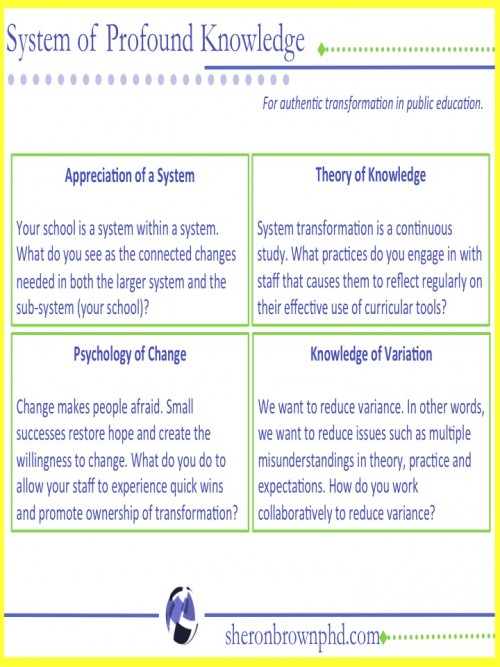[Education] 1.0 is when we managed access. 2.0 is when we thought about school improvement and got pretty good at it. 3.0 is when we start to move toward a different, and we hope, transformed paradigm.
These were the words of Valerie Hannon, a director at the Global Education Leaders’ Program on the topic of redesigning education. Her statement caused me to reflect on two previous posts: one on resting on your laurels of high performance using NCLB expectations in a Common Core world and the other on authentic transformation.
Since the turn of the millennium, I have argued that instead of focusing on educational reform we should focus on authentic educational transformation, and particularly now to address the Common Core. Here’s why. At their core reform means,
to make changes in (something, typically a social, political, or economic institution or practice) in order to improve it
and transform means,
to make a thorough or dramatic change in the form, appearance, or character of.
Today I began purging my bookshelf and I noted several papers and books produced by high profile educational institutions with the similar theme of closing the achievement gap. I would argue that if we continue attempting to “close the gap” by simply making changes to an existing system, there is a high likelihood that the gap may never close.
Perhaps it is to time embrace authentic educational transformation, that is, making a thorough changes to the way we do education. Should you as a leader decide to accept this challenge, allow me to be upfront: it won’t be easy.
Transformation occurs when leaders create a vision for transformation and a system to continually question and challenge beliefs, assumptions, patterns, habits and paradigms with an aim of continually developing and applying management theory, through the lens of the system of profound knowledge. Transformation happens when people managing a system focus on creating a new future that has never existed before, and based on continual learning and a new mindset, take different actions than they would have taken in the past (Dasko and Sheinberg, 2005, pg. 1).
Last school year I coached a school leadership team through the process of embracing authentic transformation through the lens of a system of profound knowledge (SoPK). As a result, they experienced their highest gains in the history of the school. (Contact me if you would like to know their story.)
Therefore I advocate that if your goal as a leader is to facilitate equity in educational excellence through authentic transformation, you can do two things:
- Begin exploring your team’s position as it relates to SoPK by processing your thoughts using the resource below, and
- Expand your exploration with a progressive partnership.
Distinguishing between transform versus reform may appear to be an exercise in splitting hairs, but it is clear that reforming (improving) a system that was not designed to be functional in the 21st century may not be the answer. It’s time for Education 3.0. It’s time to transform.
Reference:
Daszko, M. & Sheinberg, S. (2005). Survival is optional: Only leaders with new knowledge can lead the transformation. Retrieved from http://www.mdaszko.com/theoryoftransformation_final_to_short_article_apr05.pdf
